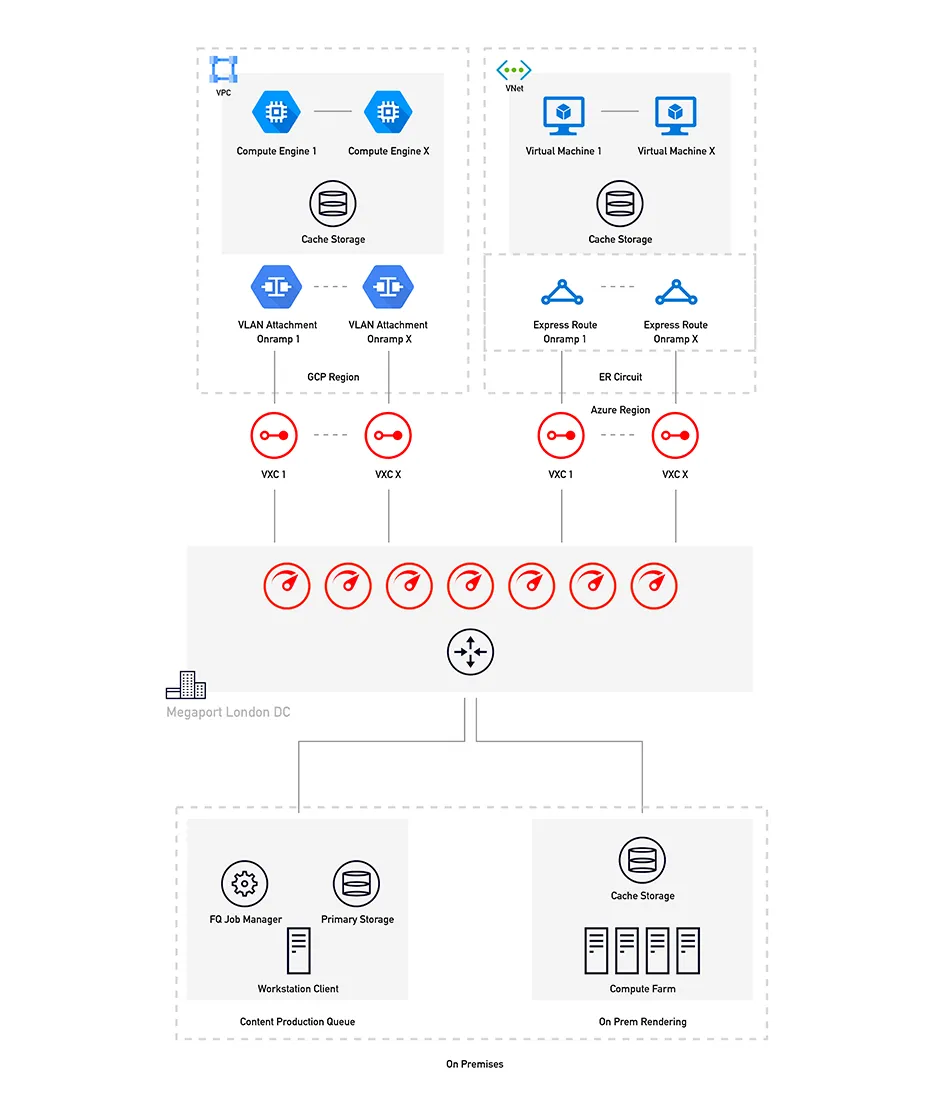About Framestore
Framestore is a BAFTA and Oscar-winning creative studio that uses innovative talent and technology to create high-end images for every platform.
Framestore partners with clients ranging from Hollywood studios and broadcasters through to video game developers and IP owners, working across film, episodic, advertising and location based entertainment including VR, AR and theme park attractions.
Recent projects include The Midnight Sky, Mulan, Wonder Woman 1984, His Dark Materials Series 1 & 2 and five themed rides for Lionsgate Entertainment World.
Key Points
- Modernised network by moving away from unreliable internet-based tunnels to private connectivity.
- Provided on-demand global capacity for real-time cloud computing for the rendering of visual effects and animations.
- Significantly reduced connectivity costs.
- Obtained low-latency, high-bandwidth connectivity for cloud rendering of on-premises data.
- Ability to remain vendor-agnostic, providing Framestore with the power to choose the best technology at any given time.
- Due to Megaport’s global reach, Framestore can now apply the same connectivity model across all their locations and access cloud resources around the world.
Case Study Snapshot
Framestore, the Oscar Award-winning visual effects company for Hollywood blockbuster films such as The Avengers and the Harry Potter series, needed additional compute capacity for its rendering artists. Naturally they turned to the cloud.
Because their vast film and animation data was stored on-premises, they needed a cloud connectivity solution that provided the required bandwidth, while giving them access to their preferred cloud providers in a pay-as-you-go model.
To be responsive to rapidly changing project demands, Framestore needed real-time solutions.
Challenge
Framestore hosted its animation and visual effects rendering compute functions on-premises. Rendering of a single frame could require anything from five minutes to three days.
As workloads increased, they often exceeded their on-premises capabilities, so in 2015, they started using Google Cloud’s compute functions. Storing their data locally meant moving vast amounts of data in and out of the cloud, so low latency high-throughput was a big factor in making cloud rendering work for them.
Framestore’s initial solution, multiple VPN tunnels via the public internet, could be slow, unreliable, and required constant oversight by their IT staff to correct problems when it unexpectedly stopped working.
By 2018, they used over 100 tunnels with 50 to 60 Gbps aggregated over all of the VPN tunnels. Typically, creative work is done during the day and the rendering is scheduled overnight, so IT staff had to be available around the clock in case the VPNs crashed.
This is why Framestore was on the lookout for a more sustainable solution.
After looking into SD-WAN, private connections, and physical ports to clouds, Framestore couldn’t find a solution that provided the flexibility and reliability they desperately needed, while meeting their budget. They didn’t want to commit to long-term contracts, such as acquiring multiple 100 Gbps connections for a year or more – simply far too expensive and inefficient. The very nature of their work required them to be able to scale the service up and down as their rendering needs changed.
“Using Megaport is so easy and consistent everywhere that we no longer have to worry about any cloud-based sort of workloads. If anyone asks whether we can connect to a new cloud or between offices quickly, the answer is, ‘Yeah. We have Megaport. It’s done.’ " Beren Lewis, Director of Global Systems and Infrastructure Technology, Framestore
Solution
Once Framestore were introduced to Megaport, the company soon realised that Megaport’s Software Defined Network (SDN) allowed them to create the on-demand, pay-as-you-go cloud connections they wanted, while supporting the compute power that animation and visual effects rendering required, with low latency and high reliability and performance.
The Megaport portal enabled Framestore to establish Virtual Cross Connects (VXCs) between their London office and Google Cloud or Microsoft Azure.
If one month they needed 40 Gbps of connectivity, they could set that up in a few clicks, and if during the next month they needed 5 Gbps, they could set that up just as easily. Their Montreal offices connected via Megaport to AWS for their rendering purposes, quickly realising the same connectivity benefits.

Benefit
- Speed and agility – Being able to spin up cloud services and connect quickly are crucial to Framestore’s fast work pace. Megaport’s flexible, fast, and easy provisioning means Framestore has connectivity when they need it, at the bandwidth they require.
- Cost – Predictable, yet flexible costs for connectivity gave Framestore an economical solution for their variable rendering needs.
- Self-service provisioning – Framestore can log into the Megaport portal and provision exactly what they need (and only what they need), connecting to whichever cloud provider they want to use for rendering. Beren Lewis, Director of Global Systems & Infrastructure Technology at Framestore, says, “It’s like going on Amazon. You search for what you need, select the quantity, and add it to your cart. Then you just press order and it’s done.”
- Great support – Framestore describes their relationship with Megaport as a partnership. “We’re so happy with them that we don’t think it’s worth assessing anyone else,” adds Lewis
Future plans for Framestore
The flexibility of Megaport’s Network as a Service (NaaS) model allows Framestore to be free to access and assess the world’s leading cloud service providers (CSP).
After using Google in Europe and AWS in North America, Framestore have now added Microsoft Azure into their multicloud mix. Each Framestore team can choose the cloud service providers with the capacity, performance, and cost efficiency they need without being tied to a particular cloud platform or provider.
The company now has Megaport connectivity in each of their European and North American Framestore locations, with port speeds ranging from 10 Gbps up to 100 Gbps.



